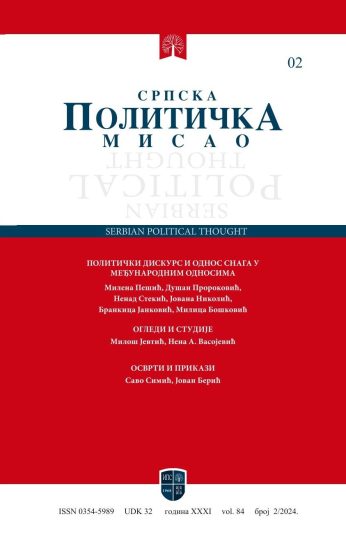Тема броја
МИГРАЦИЈЕ, ГЛОБАЛИЗАЦИЈА, ЕВРОПСКЕ ИНТЕГРАЦИЈЕ
ЗБОГ ЧЕГА РАСТЕ ЕВРОСКЕПТИЦИЗАМ: СТАВОВИ МЛАДИХ ПРЕМА ЕВРОПСКОЈ УНИЈИ
Сажетак
У првом делу рада аутори излажу кратку историју развоја евроскептичких ставова у земљама чланицама ЕУ. Као тачку преокрета у порасту евроскептицизма одређују Уговор о Европској унији (Мастрихтски уговор) из 1992. године. У другом делу рада, аутори објашњавају VCR модел који користе за објашњење мотивације у позадини скептичког става према ЕУ. Трећи део рада посвећен је представљању резултата истраживања о ставовима младих према ЕУ у Србији. У том делу се анализирају добијени подаци у светлу наведеног VCR модела. У последњем делу рада, аутори износе закључак о томе које су најзначајније варијабле које утичу на евроскептицизам и у којој мери је стање у Србији слично стању у државама чланицама.
Референце
- Gabel Matthew, Palmer D. Harvey,”Understanding variation in public support for European integration”, European Journal of Political Research, Volume 27, Issue 1, January 1995, стр. 3–19.
- Hewitt Gavin, Greece keeps eurozone guessing, Internet, http://www.bbc.com/news/world-europe-15574796 26/07/2016.
- Hooghe Liesbet, Marks Gary, “A postfunctionalist theory of European integration: From permissive consensus to constraining dissensus”, British Journal of Political Science, Volume 39, Issue 01, January 2009, стр. 1-23.
- Inglehart Ronald, “Public Opinion and Regional Integration”, International Organization, Volume 24, Issue 4, Autumn 1970, стр. 764-795.
- Inglehart Ronald, Changing Values and Political Styles Among Western Publics, Princeton Legacy Library, Princeton, 1977.
- Leconte Cécile, Understanding Euroscepticism, Plagrawe Macmillan, New York, 2010.
- Lubbers Marcel, Scheepers Peer, “Divergent trends of euroscepticism in countries and regions of the European Union”, European Journal of Political Research, Volume 49, Issue 6, October 2010, стр. 787–817.
- NSD, EU related referendums, Internet, http://www.nsd.uib.no/european_election_database/election_types/eu_related_referendums.html 26/07/2016.
- Rulikova Marketa, “The influence of pre‐accession status on Euroscepticism in EU candidate countries”, Perspectives on European Politics and Society, Volume 5, Issue 1, May 2004, стр. 29-60.
- SEIO, Istraživanja javnog mnjenja, Internet, http://www.seio.gov.rs/dokumenta/nacionalna-dokumenta.200.html 26/07/2016.
- Serricchio Fabio, Tsakatika Myrto, Quaglia Lucia, “Euroscepticism and the Global Financial Crisis”, Journal of Common Market Studies, Volume 51, Issue 1, January 2013, стр. 51-64.
- Skinner Sundlisæter Marianne, “Different Varieties of Euroscepticism? Conceptualizing and Explaining Euroscepticism in Western European Non-Member States”, Journal of Common Market Studies, Volume 51, Issue 1, January 2013, стр. 122–139.
- Skinner Sundlisæter Marianne, “Norwegian Euroscepticism: Values, Identity or Interest”, Journal of Common Market Studies, Volume 50, Issue 3, May 2012, стр. 422–440.
- Taggart Paul, “A Touchstone of Dissent: Euroscepticism in Contemporary Western European Party Systems”, European Journal of Political Research,Volume 33, Issue 3, April 1998, pp. 363–388.
- Taggart Paul, Szczerbiak Aleks, “Contemporary Euroscepticism in the party systems of the European Union candidate states of Central and Eastern Europe”, European Journal of Political Research, Volume 43, Issue 1, January 2004, стр. 1–27.
- Taggart Paul, Szczerbiak Aleks, “Europeanisation, euroscepticism and party systems: Party‐based euroscepticism in the candidate states of Central and Eastern Europe”, Perspectives on European Politics and Society, Volume 3, Issue 1, 2002, стр. 23-41.
- Vasilopoulou Sofia, “Continuity and change in the study of Euroscepticism: Plus ca change?”, Journal of common Market Studies; Volume 51. Issue 1, 2013, стр. 153-168.

